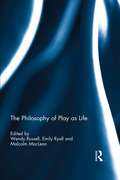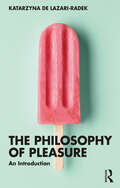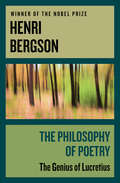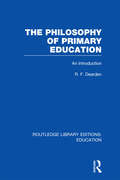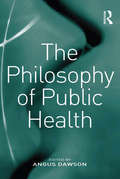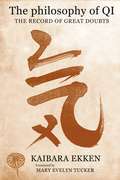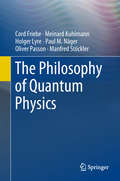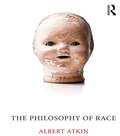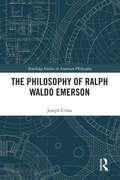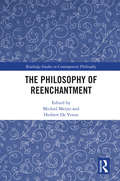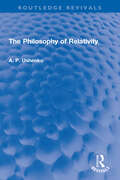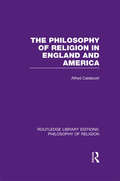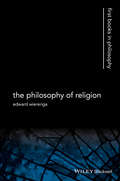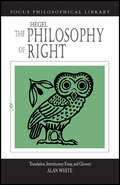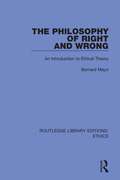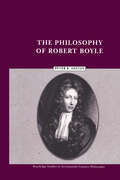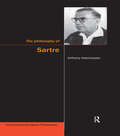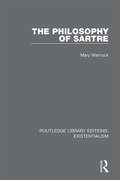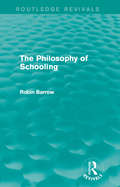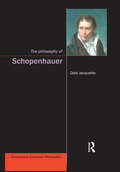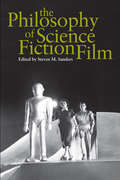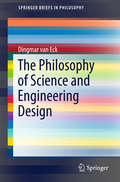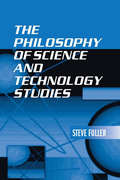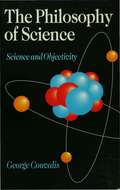- Table View
- List View
The Philosophy of Play as Life
by Emily Ryall Wendy Russell Malcolm MacLeanIt is now widely acknowledged that play is central to our lives. As a phenomenon, play poses important questions of reality, subjectivity, competition, inclusion and exclusion. This international collection is the third in a series of books (including The Philosophy of Play and Philosophical Perspectives on Play) that aims to build paradigmatic bridges between scholars of philosophy and scholars of play. Divided into four sections (Play as Life, Play as Games, Play as Art and Play as Politics), this book sheds new light on the significance of play for both children and adults in a variety of cultural settings. Its chapters encompass a range of philosophical areas of enquiry such as metaphysics, aesthetics and ethics, and the spectrum of topics explored includes games, jokes, sport and our social relationship with the Internet. With contributions from established and emerging scholars from around the world, The Philosophy of Play as Life is fascinating reading for all those with an interest in playwork, the ethics and philosophy of sport, childhood studies or the philosophy of education.
The Philosophy of Pleasure: An Introduction
by Katarzyna de Lazari-RadekThe experience of pleasure, alongside pain, is a primary element of human life. It rules our instincts and desires for food, sex and avoiding various forms of harm. Crucial to psychological and social well-being, it has preoccupied philosophers from Aristotle to John Stuart Mill and plays a fundamental role in moral and ethical theory, especially utilitarianism. More recently, it has become a central subject for psychologists, biologists and neuroscientists.Yet it remains an elusive and deceptively difficult concept. What is pleasure? How does it differ from happiness? Should we value pleasure? Should we value only pleasure? Which theories of pleasure are most plausible? In this rigorous and comprehensive introduction to the topic, Katarzyna de Lazari-Radek unpacks and assesses these questions and many more, including: The history of pleasure from ancient China, India and Greece to modern times Pleasure, sensation, feeling and consciousness What scientific research reveals about the nature of pleasure – can pleasure be measured scientifically? "Higher" and "lower" pleasures The relation between happiness and pleasure Pleasure and pain Pleasure and animals Pleasure as an ultimate good and the relation between pleasure and rationality. The Philosophy of Pleasure: An Introduction is essential reading for students of ethics and political philosophy, and also suitable for those studying related disciplines such as psychology, politics and sociology.
The Philosophy of Poetry: The Genius of Lucretius
by Henri BergsonThis is a partial translation by Wade Baskin of the original French work Ecrits et Paroles (a 3 volume set, 665 pages) published between 1957 and 1959 by Henri Bergson. It includes the translation from Bergson&’s introduction to a French ed. of De rerum natura, by Lucretius published in 1884 under the title: Extraits de Lucre`ce.
The Philosophy of Poetry: The Genius of Lucretius
by Henri BergsonThis is a partial translation by Wade Baskin of the original French work Ecrits et Paroles (a 3 volume set, 665 pages) published between 1957 and 1959 by Henri Bergson. It includes the translation from Bergson&’s introduction to a French ed. of De rerum natura, by Lucretius published in 1884 under the title: Extraits de Lucre`ce.
The Philosophy of Primary Education: An Introduction (Routledge Library Editions: Education)
by R F DeardenThis volume provides a rigorous examination of theoretical concepts such as need, interest, growth, play, experience, activity and self-expression. It also makes an important contribution towards getting a closely argued educational theory. In the first part of the book the author establishes general aims and ends with suggestions as to what the curriculum ought to be. The second part is concerned with the procedures of learning and teaching appropriate to such a curriculum.
The Philosophy of Public Health
by Angus DawsonPublic health is a particular area of medical practice that raises a series of philosophical issues that require urgent discussion. The philosophy of public health includes metaphysical questions such as, what do we mean by 'public' in public health? How ought we to conceptualise the idea of 'populations'? Are they merely aggregations of individuals? It also includes epistemological questions such as, what methods are most appropriate for thinking about public health? How do empirical and normative issues relate to each other? Controversial ethical, political and social issues, including those relating to vaccinations, the threat of pandemics and possible restrictions to individual liberties, public health research, screening and obesity policy should also be considered. This volume includes a diverse set of papers exploring a number of the most important theoretical and practical issues that arise across the whole field of the philosophy of public health.
The Philosophy of Qi: The Record of Great Doubts (Translations from the Asian Classics)
by Kaibara EkkenThe Record of Great Doubts emphasizes the role of qi in achieving a life of engagement with other humans, with the larger society, and with nature as a whole. Rather than encourage transcendental escapism or quietism, Ekken articulates a philosophy of material force as a basis of living a life of commitment to the world. In this spirit, moral cultivation is not an isolated or a self-centered preoccupation, but an activity that occurs within the dynamic forces of nature and amid the rigorous demands of society. In this context, a vitalism of qi is an emergent force, not only providing the philosophical grounding for this vibrant interaction but also giving a basis for an investigation of the natural world that plumbs the principle within things. Ekken thus aimed to articulate a creative and dynamic milieu for moral education, political harmony, social coherence, and agricultural sustainability. The Record of Great Doubts embodies Ekken's profound commitment to Confucian ideas and practices as a method for establishing an integrative ethical vision, one he hoped would guide Japan through a new period of peace and stability. A major philosophical treatise in the Japanese Neo-Confucian tradition, The Record of Great Doubts illuminates a crucial chapter in East Asian intellectual history.
The Philosophy of Quantum Physics
by William D. Brewer Paul M. Näger Cord Friebe Meinard Kuhlmann Holger Lyre Oliver Passon Manfred StöcklerThis book provides a thorough and up-to-date introduction to the philosophy of quantum physics. Although quantum theory is renowned for its spectacular empirical successes, controversial discussion about how it should be understood continue to rage today. In this volume, the authors provide an overview of its numerous philosophical challenges: Do quantum objects violate the principle of causality? Are particles of the same type indistinguishable and therefore not individual entities? Do quantum objects retain their identity over time? How does a compound quantum system relate to its parts? These questions are answered here within different interpretational approaches to quantum theory. Finally, moving to Quantum Field Theory, we find that the problem of non-locality is exacerbated. Philosophy of quantum physics is aimed at philosophers with an interest in physics, while also serving to familiarize physicists with many of the essential philosophical questions of their subject.
The Philosophy of Race
by Albert Atkin"Race" is so highly charged and loaded a concept it often hampers critical thinking about racial practice and policy. A philosophical approach allows us to isolate and analyse the key questions: What is race? Can we do without race? What is racism and why is it wrong? What should our policies on race and racism be? The Philosophy of Race presents a concise and up-to-date overview of the central philosophical debates about race. It then builds on this philosophical foundation to analyse the sociopolitical questions of racism and race-relevant policy. Throughout, the discussion is illustrated with a wide range of examples: Afro-American 'blackness'; British-Asian racial formation; Aboriginal identity in Australia; the racial grouping of Romany-Gypsies and Jews in Europe; categories of race in Brazil; and the concept of model minorities in the US and UK.
The Philosophy of Ralph Waldo Emerson (Routledge Studies in American Philosophy)
by Joseph UrbasThis study offers the first comprehensive account of Emerson's philosophy since his philosophical rehabilitation began in the late 1970s. It builds on the historical reconstruction proposed in the author's previous book, Emerson's Metaphysics, and like that study draws on the entire Emerson corpus—the poetry and sermons included. The aim here is expository. The overall though not exclusive emphasis is on identity, as the first term of Emerson's metaphysics of identity and flowing or metamorphosis. This metaphysics, or general conception of the nature of reality, is what grounds his epistemology and ethics, as well as his esthetic, religious, and political thought. Acknowledging its primacy enables a general account like this to avoid the anti-realist overemphasis on epistemology and language that has often characterized rehabilitation readings of his philosophy. After an initial chapter on Emerson's metaphysics, the subsequent chapters devoted to the other branches of his thought also begin with their "necessary foundation" in identity, which is the law of things and the law of mind alike. Perception of identity in metamorphosis is what characterizes the philosopher, the poet, the scientist, the reformer, and the man of faith and virtue. Identity of mind and world is felt in what Emerson calls the moral sentiment. Identity is Emerson's answer to the Sphinx-riddle of life experienced as a puzzling succession of facts and events.
The Philosophy of Reenchantment (Routledge Studies in Contemporary Philosophy)
by Michiel Meijer Herbert De VrieseThis book presents a philosophical study of the idea of reenchantment and its merits in the interrelated fields of philosophical anthropology, ethics, and ontology. It features chapters from leading contributors to the debate about reenchantment, including Charles Taylor, John Cottingham, Akeel Bilgrami, and Jane Bennett. The chapters examine neglected and contested notions such as enchantment, transcendence, interpretation, attention, resonance, and the sacred or reverence-worthy—notions that are crucial to human self-understanding but have no place in a scientific worldview. They also explore the significance of adopting a reenchanting perspective for debates on major concepts such as nature, naturalism, God, ontology, and disenchantment. Taken together, they demonstrate that there is much to be gained from working with a more substantial and affirmative concept of reenchantment, understood as a fundamental existential orientation towards what is seen as meaningful and of value. The Philosophy of Reenchantment will be of interest to scholars and advanced students in philosophy—especially those working in moral philosophy, metaphysics, philosophy of religion, theology, religious studies, and sociology.
The Philosophy of Relativity (Routledge Revivals)
by A. P. UshenkoFirst published in 1937, The Philosophy of Relativity contains an exposition of Einstein, a step-by step deduction of the main equations of both the special and general theories of relativity. This book sets out to expound an original theory of events, change and space-time, and to offer a new explanation of perception. But in order to ramify his belief in the objective reality of space and time, the author digresses into problems of general interest such as cognitive significance of art and Zeno’s paradoxes. He also defends his theory in an appraisal of the fashionable views of logical positivism and pragmatism. This book is a must read for scholars and researchers of philosophy of science and philosophy in general.
The Philosophy of Religion in England and America (Routledge Library Editions: Philosophy of Religion)
by Alfred CaldecottA classic in the area, originally published in 1901, this book is a survey of the past work in the field of philosophy of religion, a conspectus of literature and comparison of methods and theologies from the Reformation to the start of the twentieth century. The Introduction part of the volume offers a classification system to explain the order of the detailed section of the book. Lesser-known theologians are covered as well as great thinkers, a deliberate choice on the part of the author. Within each chapter, types of theism are then broken down into sections on individual thinkers, or group of thinkers with a reference to their main works.
The Philosophy of Religion: An Inquiry Into Divine Attributes (First Books in Philosophy)
by Edward R. WierengaPhilosophy of Religion is an engaging introduction to the main tenets of this fascinating subject, written clearly and with detailed enough explanation to be accessible to those new to the field, whilst providing original and challenging ideas to more experienced students. The ideal introduction to this fascinating subject, providing a clear and engaging entry point to the field The book lucidly introduces the main issues in philosophy of religion and develops a rigorous yet accessible approach to evaluating positions on these issues No previous exposure to philosophy is assumed, and more technical topics are introduced and explained before they are employed Original ideas and new approaches to concepts within the book ensure that it is also relevant to those already familiar with the subject
The Philosophy of Right
by Alan White Georg Wilhelm Friedrich HegelA modern, highly readable translation of a primary text in Western philosophy. Complete translation in English with introduction, notes and glossary. The glossary is keyed to the primary occurrences of important terms in the text and provides insights into the concepts beyond the translation, especially useful pedagogical device for students coming to Hegel for the first time. Focus Philosophical Library translations are close to and are non-interpretative of the original text, with the notes and a glossary intending to provide the reader with some sense of the terms and the concepts as they were understood by Hegel's immediate audience.
The Philosophy of Right and Wrong
by Bernard MayoTrying to understand morality involves grappling with seemingly irreconcilable conflicts between opposing theoretical positions. Originally published in 1986, this book offers a solution in terms of natural law, which involves reflections on the relevant aspects of human nature and the human condition, as well as on the special nature of prescriptive language. It also discusses several major movements in moral philosophy, both classical and contemporary and examines them in the light of a set of tests for an adequate moral theory.
The Philosophy of Robert Boyle (Routledge Studies in Seventeenth-Century Philosophy #Vol. 5)
by Peter R. AnsteyFirst Published in 2004. Routledge is an imprint of Taylor & Francis, an informa company.
The Philosophy of Sartre (Continental European Philosophy Ser. #13)
by Anthony HatzimoysisPlaywright, novelist, political theorist, literary critic and philosopher, Jean-Paul Sartre (1905-80) remains an iconic figure. This book examines his philosophical ideas and methods. It is an introductory guide for the student who wishes to understand Sartre's philosophical argumentation. It reconstructs in plain language key instances of Sartre's philosophical reasoning at work and shows how certain questions arise for Sartre and what philosophical tools he uses to address those questions. Each chapter considers a range of issues in the Sartrean corpus including his conception of phenomenology, the question of self-identity, the Sartrean view of conscious beings, his understanding of the self, his theory of value, human action as both the originator and the outcome of social processes, dialectical reason, and his conception of artistic activity. Hatzimoysis uncovers the philosophical argumentation, identifies Sartre's most important philosophical ideas and addresses the arguments in which those ideas are employed. Readers are able to get a real understanding of Sartre's approach to the activity of philosophising and how his method favours certain types of philosophical analysis.
The Philosophy of Sartre (Routledge Library Editions: Existentialism #7)
by Mary WarnockThis book, first published in 1965, is a critical exposition of the philosophical doctrines of Jean-Paul Sartre. His contribution to ethical and political theory, and to metaphysics and ontology, is reviewed against the background of German idealism and phenomenology, and his arguments are presented clearly so that readers may assess their philosophical value in their own right.
The Philosophy of Schooling (Routledge Revivals)
by Robin BarrowThis book, first published in 1981, provides a penetrating and lucid introduction to the philosophy of education. The emphasis on schooling rather than education draws attention to the broad spectrum of the book: recognising that schools generally do more than educate, Dr. Barrow specifically addresses himself to the larger question of what schools are for and what they should do. This book will be of interest both to students of philosophy and students of education.
The Philosophy of Schopenhauer (Continental European Philosophy Ser. #6)
by Dale JacquetteDale Jacquette charts the development of Schopenhauer's ideas from the time of his early dissertation on The Fourfold Root of the Principle of Sufficient Reason through the two editions of his magnum opus The World as Will and Representation to his later collections of philosophical aphorisms and competition essays. Jacquette explores the central topics in Schopenhauer's philosophy including his metaphysics of the world as representation and Will, his so-called pessimistic philosophical appraisal of the human condition, his examination of the concept of death, his dualistic analysis of free will, and his simplified non-Kantian theory of morality. Jacquette shows how these many complex themes fit together in a unified portrait of Schopenhauer's philosophy. The synthesis of Plato, Kant and Buddhist and Hindu ideas is given particular attention as is his influence on Nietzsche, first a follower and then arch opponent of Schopenhauer's thought, and the early Wittgenstein. The book provides a comprehensive and in-depth historical and philosophical introduction to Schopenhauer's distinctive contribution to philosophy.
The Philosophy of Science Fiction Film (The\philosophy Of Popular Culture Ser.)
by Steven M. SandersThought-provoking essays on movies from Metropolis to The Matrix. The science fiction genre, through films such as Blade Runner, Invasion of the Body Snatchers, and The Terminator, not only entertains us but makes us think—about the implications of new technologies, the parameters and possibilities of space and time, and, in the age of artificial intelligence and robotics, the meaning of humanity itself. The Philosophy of Science Fiction Film explores the storylines, conflicts, and themes of fifteen science fiction film classics. Editor Steven M. Sanders and a group of outstanding scholars in philosophy, film studies, and other fields raise science fiction film criticism to a new level by penetrating the surfaces of the films to expose the underlying philosophical arguments, ethical perspectives, and metaphysical views.
The Philosophy of Science and Engineering Design
by Dingmar Van EckThis book discusses the relationship between the philosophy of science and philosophy of engineering, and demonstrates how philosophers of engineering design as well as design researchers can benefit from the conceptual toolkit that the philosophy of science has to offer. In this regard, it employs conceptual tools from the philosophical literature on scientific explanation to address key issues in engineering design and philosophy of engineering design. Specifically, the book focuses on assessing the explanatory value of function ascriptions used in engineering design and philosophy of technical functions; on elaborating the structure of explanation in engineering design; on assessing the role and value of design representations in engineering design and philosophy thereof; and on elaborating means for the testing of design methods. Presenting a novel and effective approach to tackling key issues in the field, philosophers of engineering and design alike will greatly benefit from this book.
The Philosophy of Science and Technology Studies: A New Beginning For Science And Technology Studies
by Steve FullerAs the field of Science and Technology Studies (STS) has become more established, it has increasingly hidden its philosophical roots. While the trend is typical of disciplines striving for maturity, Steve Fuller, a leading figure in the field, argues that STS has much to lose if it abandons philosophy. In his characteristically provocative style, he offers the first sustained treatment of the philosophical foundations of STS and suggests fruitful avenues for further research. With stimulating discussions of the Science Wars, the Intelligent Design Theory controversy, and theorists such as Donna Haraway and Bruno Latour, Philosophy of Science and Technology Studies is required reading for students and scholars in STS and the philosophy of science.
The Philosophy of Science: Science and Objectivity
by S George CouvalisThis comprehensive textbook provides a clear nontechnical introduction to the philosophy of science. Through asking whether science can provide us with objective knowledge of the world, the book provides a thorough and accessible guide to the key thinkers and debates that define the field. George Couvalis surveys traditional themes around theory and observation, induction, probability, falsification and rationality as well as more recent challenges to objectivity including relativistic, feminist and sociological readings. This provides a helpful framework in which to locate the key intellectual contributions to these debates, ranging from those of Mill and Hume, through Popper and Kuhn to Laudan, Bloor and Garfinkel among others.
